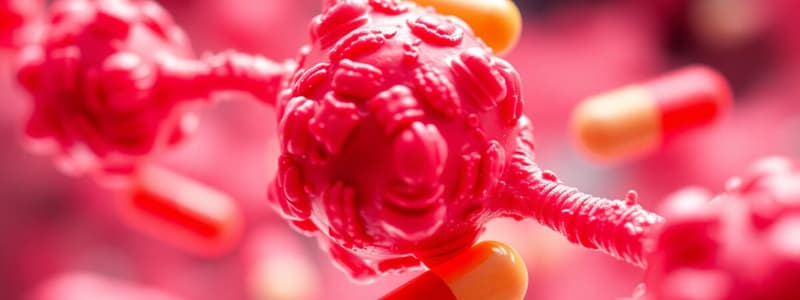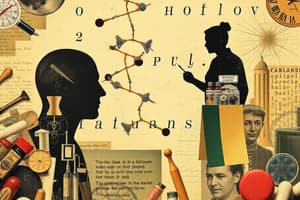Podcast
Questions and Answers
Which type of drugs specifically block the function of receptors?
Which type of drugs specifically block the function of receptors?
- Cyclic GMP modulators
- Antagonists (correct)
- Transport enhancers
- Agonists
What is an example of a drug that acts on ion channels?
What is an example of a drug that acts on ion channels?
- Fluoxetine
- Enalapril
- Phenytoin
- Amlodipine (correct)
Which receptor type binds to adrenaline?
Which receptor type binds to adrenaline?
- Tyrosine kinase receptor
- G Protein coupled receptor (correct)
- Ligand gated ion channel
- Nuclear receptor
What clinical effect can be caused by liver enzyme induction?
What clinical effect can be caused by liver enzyme induction?
Which drug is known for transitioning from first order to zero order kinetics at high doses?
Which drug is known for transitioning from first order to zero order kinetics at high doses?
Which of the following is NOT a use of adrenaline?
Which of the following is NOT a use of adrenaline?
Where should local anesthetic NOT be mixed with adrenaline?
Where should local anesthetic NOT be mixed with adrenaline?
Which of these drugs is used for hypotension and shock?
Which of these drugs is used for hypotension and shock?
What is the primary mechanism of action of methotrexate?
What is the primary mechanism of action of methotrexate?
Which of the following is NOT a common side effect of NSAIDs?
Which of the following is NOT a common side effect of NSAIDs?
Which medication is known as a xanthine oxidase inhibitor used to treat gout?
Which medication is known as a xanthine oxidase inhibitor used to treat gout?
What is a low dose of aspirin typically used for?
What is a low dose of aspirin typically used for?
Which condition is a contraindication for the use of NSAIDs?
Which condition is a contraindication for the use of NSAIDs?
Which of the following conditions can infliximab be used to treat?
Which of the following conditions can infliximab be used to treat?
Which adverse effect is commonly associated with the use of methotrexate?
Which adverse effect is commonly associated with the use of methotrexate?
What effect does aspirin have at a moderate dose (300-600 mg/day)?
What effect does aspirin have at a moderate dose (300-600 mg/day)?
What is a primary use of prazosin?
What is a primary use of prazosin?
Which medication would be used for hypertensive emergencies?
Which medication would be used for hypertensive emergencies?
What is an effect of using beta blockers with intrinsic sympathomimetic activity?
What is an effect of using beta blockers with intrinsic sympathomimetic activity?
Which of the following is a muscarinic receptor agonist used for urinary retention?
Which of the following is a muscarinic receptor agonist used for urinary retention?
What does ED50 refer to in pharmacology?
What does ED50 refer to in pharmacology?
Which of the following is NOT an adverse effect of acyclovir?
Which of the following is NOT an adverse effect of acyclovir?
Which drug is a third-generation cephalosporin?
Which drug is a third-generation cephalosporin?
Which NSAID is known for high anti-inflammatory properties?
Which NSAID is known for high anti-inflammatory properties?
What is a common adverse effect of Hydroxychloroquine in patients with rheumatoid arthritis?
What is a common adverse effect of Hydroxychloroquine in patients with rheumatoid arthritis?
Which of the following is a non-depolarizing neuromuscular blocker?
Which of the following is a non-depolarizing neuromuscular blocker?
How does Hydroxychloroquine work in rheumatoid arthritis treatment?
How does Hydroxychloroquine work in rheumatoid arthritis treatment?
What is the primary mechanism of action of succinylcholine at the neuromuscular junction?
What is the primary mechanism of action of succinylcholine at the neuromuscular junction?
What effect does a deficiency in pseudocholinesterase have on the action of succinylcholine?
What effect does a deficiency in pseudocholinesterase have on the action of succinylcholine?
Which of the following is NOT an example of a non-depolarizing neuromuscular blocker?
Which of the following is NOT an example of a non-depolarizing neuromuscular blocker?
What chemical action do non-depolarizing neuromuscular blockers primarily perform?
What chemical action do non-depolarizing neuromuscular blockers primarily perform?
Which of the following monoclonal antibodies is NOT typically used for treating rheumatoid arthritis?
Which of the following monoclonal antibodies is NOT typically used for treating rheumatoid arthritis?
Flashcards
Drug targets
Drug targets
Specific locations on or within a cell where a drug exerts its effect.
Receptor targets
Receptor targets
Proteins that drugs bind to, either activating (agonist) or blocking (antagonist) their function.
Enzyme targets
Enzyme targets
Enzymes (proteins) that chemical reactions, and drugs can either activate or inhibit to control cellular processes.
Transporter targets
Transporter targets
Signup and view all the flashcards
Enzyme induction
Enzyme induction
Signup and view all the flashcards
1st vs. 0th order kinetics
1st vs. 0th order kinetics
Signup and view all the flashcards
Therapeutic monitoring
Therapeutic monitoring
Signup and view all the flashcards
Adrenaline uses
Adrenaline uses
Signup and view all the flashcards
Thromboxane A2
Thromboxane A2
Signup and view all the flashcards
Aspirin's effect on Thromboxane A2
Aspirin's effect on Thromboxane A2
Signup and view all the flashcards
Selective COX-2 inhibitor uses
Selective COX-2 inhibitor uses
Signup and view all the flashcards
Mefenamic acid uses
Mefenamic acid uses
Signup and view all the flashcards
NSAIDs side effects
NSAIDs side effects
Signup and view all the flashcards
NSAIDs contraindications
NSAIDs contraindications
Signup and view all the flashcards
Methotrexate MOA
Methotrexate MOA
Signup and view all the flashcards
Allopurinol MOA
Allopurinol MOA
Signup and view all the flashcards
Latent TB Reactivation
Latent TB Reactivation
Signup and view all the flashcards
Monoclonal Antibody Targets in RA
Monoclonal Antibody Targets in RA
Signup and view all the flashcards
Hydroxychloroquine MOA in RA
Hydroxychloroquine MOA in RA
Signup and view all the flashcards
Hydroxychloroquine Side Effects
Hydroxychloroquine Side Effects
Signup and view all the flashcards
Neuromuscular Blocker Classification
Neuromuscular Blocker Classification
Signup and view all the flashcards
Succinylcholine and Pseudocholinesterase
Succinylcholine and Pseudocholinesterase
Signup and view all the flashcards
Succinylcholine and Genetic Variation
Succinylcholine and Genetic Variation
Signup and view all the flashcards
Prolonged Succinylcholine Action
Prolonged Succinylcholine Action
Signup and view all the flashcards
Prazosin Uses
Prazosin Uses
Signup and view all the flashcards
Labetalol Uses
Labetalol Uses
Signup and view all the flashcards
Beta-Blockers with Intrinsic Sympathomimetic Activity
Beta-Blockers with Intrinsic Sympathomimetic Activity
Signup and view all the flashcards
Drug Efficacy
Drug Efficacy
Signup and view all the flashcards
Drug Potency
Drug Potency
Signup and view all the flashcards
ED50, TD50, LD50
ED50, TD50, LD50
Signup and view all the flashcards
Atropine Substitutes in Ophthalmology
Atropine Substitutes in Ophthalmology
Signup and view all the flashcards
Bethanecol Uses
Bethanecol Uses
Signup and view all the flashcards
Study Notes
Paper 1 - Pharmacology
-
Drug Targets: Drugs can act on receptors (activating or blocking), ion channels, enzymes, or transporters.
-
Receptors on Cell Membranes:
-
Ligand-gated ion channels (e.g., nicotinic acetylcholine receptors)
-
G protein-coupled receptors (e.g., beta-adrenergic receptors)
-
Example Drug with cGMP as Secondary Messenger: Nitroglycerin, Sildenafil (Viagra).
-
pH and Drug Ionization: The pH of a medium affects a drug's ionization, impacting its solubility, absorption, and distribution. This is described by the Henderson-Hasselbalch equation.
-
Drugs That Induce Liver Enzymes: Antiepileptic drugs (phenytoin, phenobarbital), anti-tubercular drugs (rifampin, rifabutin), and antiretroviral drugs (efavirenz, nevirapine)
-
Enzyme Induction Clinical Relevance:
-
Reduced efficacy of oral contraceptives
-
Sub-therapeutic effect of warfarin
-
Drugs That Change Kinetics (1st order to 0 order):
-
Phenytoin
-
Ethanol
-
Drugs Requiring Therapeutic Monitoring:
-
Warfarin
-
Digoxin
-
Dopamine vs. Dobutamine:
-
Dopamine: Acts on dopamine and beta-1 adrenergic receptors (at moderate doses), alpha-adrenergic receptors (high doses) and is used in shock to improve blood pressure. It increases heart rate significantly and has dose-dependent effects on blood vessels (vasodilation, mixed effects, vasoconstriction).
-
Dobutamine: Primarily a beta-1 adrenergic agonist with minimal effect on alpha or dopamine receptors. Used in heart failure to increase cardiac output. It minimally increases heart rate and primarily improves contractility and has minimal effect on blood vessels.
-
Adrenaline Uses: Anaphylaxis, asthma, cardiac arrest, and local anesthesia.
-
Sites to Avoid Mixing Adrenaline with Local Anesthetics: Fingers, nose, toes, eyes and penis
-
Noradrenaline Uses: Hypotension and shock, and cardiac arrest
-
Prazosin (Alpha Blocker) Uses: Hypertension and benign prostatic hyperplasia.
-
Labetalol (Alpha + Beta Blocker) Uses: Hypertension, hypertensive emergency, angina, and heart failure.
-
Potency and Efficacy:
-
Potency: The amount of drug needed to produce a given effect (lower dose = higher potency).
-
Efficacy: The maximum effect a drug can produce (regardless of dose).
-
Anticholingeric substitutes for ophthalmology: Tropicamide, cyclopentolate, homatropine
-
Atropine substitutes for respiratory conditions: Ipratropium, tiotropium, oxitropium, glycopyrrolate
-
Bethanecol (cholinergic agonist) uses: Urinary retention, postoperative ileus, and neurogenic bladder
-
Adverse effect vs. Side effect:
-
Adverse effect: Serious, life-threatening, unpredictable effects.
-
Side effect: Milder, non-harmful effects, usually predictable, and occur at therapeutic doses.
-
ED50, TD50, LD50:
-
ED50 (Effective Dose 50): Dose of a drug causing a therapeutic effect in 50% of the population
-
TD50 (Toxic Dose 50): Dose of a drug causing toxic effects in 50% of the population
-
LD50 (Lethal Dose 50): Dose of a drug causing death in 50% of the population.
-
Acyclovir adverse effects: GI disturbance, renal toxicity, and neurotoxicity
-
Viral Hepatitis drugs:
-
Hepatitis B: Tenofovir, entecavir, lamivudine, adefovir, pegylated interferon
-
Hepatitis C: Sofosbuvir, ledipasvir, daclatasvir, ribavirin
-
Hepatitis D: Pegylated interferon
-
Hepatitis E: Ribavirin (certain cases)
-
Antifungal drugs:
-
Polyenes (amphotericin B, nystatin)
-
Azoles (clotrimazole, ketoconazole, fluconazole, itraconazole, voriconazole)
-
Echinocandins (caspofungin, micafungin, anidulafungin)
-
Allylamines (terbinafine, naftifine, butenafine)
-
Flucytosine
-
Griseofulvin
-
Topical antifungal (terbinafine, clotrimazole, miconazole, econazole, ciclopirox, undecylenic acid)
-
Cephalosporin Uses: Respiratory tract infection, UTIs, skin and soft tissue infection, surgical prophylaxis.
-
3rd Generation Cephalosporins: Ceftriaxone, Cefotaxime, Ceftazidime, Cefdinir, Cefixime, Cefpodoxime, Cefoperazone, Ceftibuten
-
NSAIDs with high anti-inflammatory properties: Indomethacin, Diclofenac
-
NSAIDs with high analgesic properties: Ibuprofen, Naproxen
-
Aspirin MOA (low doses): Irreversibly acetylates COX-1, reducing thromboxane A2 production, preventing platelet aggregation.
-
Selective COX-2 inhibitors uses: Osteoarthritis, Rheumatoid arthritis
-
Mefenamic acid uses: Pain relief, anti-inflammatory
-
NSAID side effects: GI irritation, renal impairment, and cardiovascular risks.
-
NSAID contraindications: Active peptic ulcer disease, renal impairment
-
Aspirin uses based on dose:
-
Low dose: cardiovascular protection
-
Moderate dose: pain relief
-
High dose: anti-inflammatory
-
Methotrexate MOA: Inhibits dihydrofolate reductase (DHFR), interfering with nucleotide synthesis for rapidly dividing cells.
-
Methotrexate adverse effects: Bone marrow suppression, hepatotoxicity, mouth ulcers, and GI distress
-
Allopurinol MOA: Inhibits xanthine oxidase, preventing uric acid production.
-
Infliximab uses: Rheumatoid arthritis, Crohn's disease, ulcerative colitis.
-
Monoclonal antibodies used to treat Rheumatoid arthritis:
-
Infliximab (targets TNF-alpha)
-
Adalimumab (targets TNF-alpha)
-
Rituximab (targets CD20 antigen in B-cells)
-
Tocilizumab (targets IL-6 receptor)
-
Hydroxychloroquine MOA: Mechanism to reduce inflammation in rheumatoid arthritis
-
Hydroxychloroquine adverse effect.: Retinopathy, nausea, and vomiting
-
Neuromuscular blockers: Non-depolarizing (competitive blockers), depolarizing (agonists)
-
Non-depolarizing neuromuscular blockers: Pancuronium, vecuronium, rocuronium, atracurium
-
Depolarizing neuromuscular blockers: Succinylcholine
-
Succinylcholine interaction with genetic makeup: Individuals with pseudocholinesterase deficiency experience a prolonged neuromuscular blockade.
-
Interactions of aminoglycosides and non-depolarizing neuromuscular blockers: Aminoglycosides enhance the effects of non-depolarizing neuromuscular blockers by inhibiting acetylcholine release.
Studying That Suits You
Use AI to generate personalized quizzes and flashcards to suit your learning preferences.




